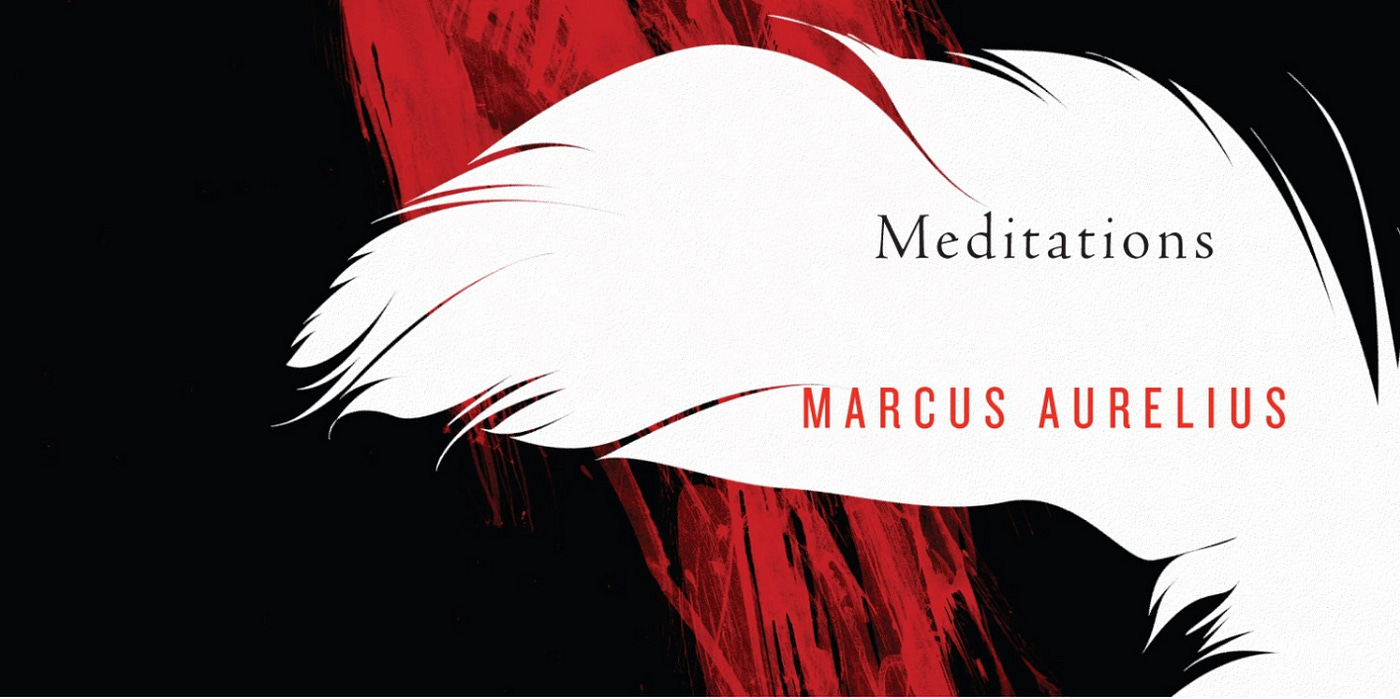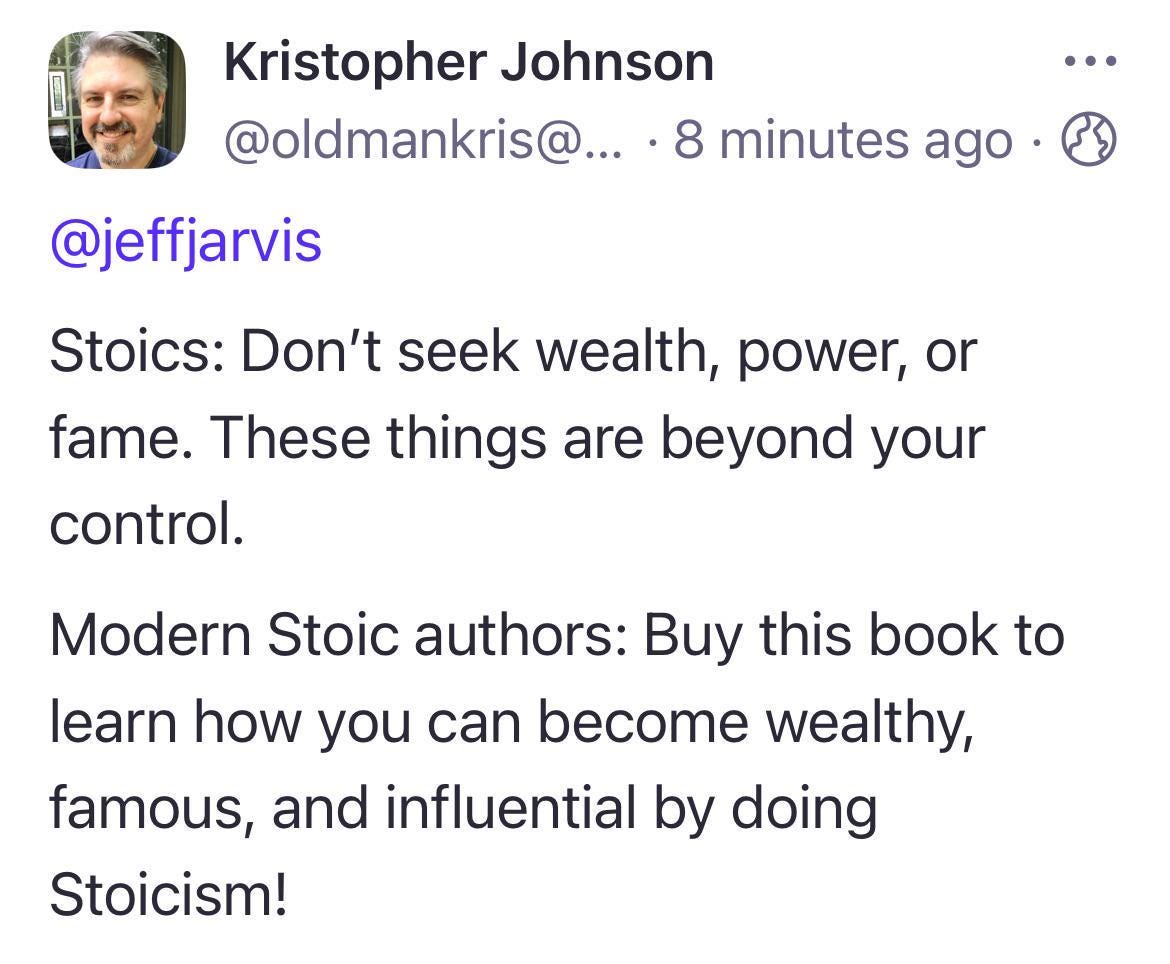We're Reclaiming Stoicism from the Bros. They're Doing it Wrong.
Sign Up for Session Five of The Peak Notions Book Club!
This week’s article is both a quick look at stoicism and an announcement of the next book club title. The book club is a paid subscriber perk. To thank you for your support, for one day only I’m offering 30% off any paid subscription for an entire year! A paid subscription gets you access to audio content and bonus writing, the entire archive, the weekly chat and the Book Club sign-up sheet (linked below). Thank you for supporting what I do and making this preposterously excellent job I do a reality!
I have wondered often how it comes that, while every man loves himself beyond all others, yet he holds his own opinion of himself in less esteem than the opinion of others.
Marcus Aurelius, Meditations
Alright, so I think it’s time we took Stoicism back from the bros. Or at least gave it a break from them. Stoicism is a rich philosophical tradition rather than a way to ensure you maximise the efficiency of your life. Don’t get me wrong — I’m weary of the ivory tower theory of philosophy that suggests it is a sort of Fabergé egg, too delicate and intricate to be handled by the mucky, brutish hand of anyone who isn’t currently working as an academic philosopher and sweating in their office to pump out the requisite number of papers to get promoted. Philosophy is theory, and everything has an attendant theory. When we think it doesn’t, it is because we have mistaken a single theory for reality. All of us understand, interpret and utilise information through some theoretical engine or other, even when we don’t realise that this is what we are doing. That is not subject-specific expertise but knowledge that all of us should carry forward into our lives.
We can think of philosophy in a general sense as theory - the understanding, exposure and deconstruction (or construction) of the ideas that lie deep in the bedrock of everything we think and everything we do. In a completely baffling world, it is what we might use to step back from whatever is imminently in front of us to consider the ideas and assumptions that sit opaquely beneath what we believe we know. Elements of philosophy certainly can be used for problem-solving, if only because a problem is easier to tackle once you can form a holistic understanding of it. Its context, origins and implications. The web of ideas within which it inconveniently sits.
But philosophy isn’t a crowbar and neither is stoicism. Even if stoicism can seem a bit like one on social media, largely because given its popularity, a scroll through your feed can sometimes feel like you’re being beaten to death with it. That’s what happens when you take an ontology and cut the nuance away because it’s hard to turn it into a thirty second life hack video.
The bros are not alright
Stoicism is not about goal-smashing and self-actualisation. It is about self-control and abnegation. It is a revolutionary reevaluation of our relationship with the desires that drive us and the emotions that are to us what a carrot on a string is to a hungry donkey. This makes for an absolutely terrible consumer product — stoicism is not about attaining what we want but about changing what we want. It is not about acquisition but about living a virtuous life.
Marcus Aurelius’ Meditations is an ideal point of entry to Stoicism for those who are interested in learning more about it, or for anyone who would like to consider how the set of ideas which has become foundational to several modern therapeutic methodologies — like cognitive behavioural therapy — applies to everyday life. Written by the Roman Emperor while he was on campaign and never intended for publication as we now think of it, the book is a comfortably short and pleasurable read, less dense and repetitive than a lot of philosophical work. It is not a structured book but a series of personal writings by one man to himself. A philosopher with unconscionable practical responsibilities refining his ideas during a crucial time in his life. Because it is unstructured, written in a very different tone and voice to other works of its time, and because Marcus had a clear gift for economy and flair in writing, Meditations has become arguably the most quotable and quoted work of philosophy in history. This is a blessing in that it ensured the book is still prominent, relevant and in print today, around 1,840 years after it was written. It’s a curse in that you can put one of those quotes on a t-shirt for #lifespo and walk away with a slightly greasy to-go bag version of stoicism.
Marcus spent his life after becoming Emperor trying as best he could to live like a philosopher - arguably an impossible task but then striving is at the heart of stoicism. Meditations’ central idea considers how we can pursue a virtuous life by living according to principles which help us determine what feels good from what is good, and what feels bad from what is bad - something most of us never entirely achieve. It is an account of a life lived in pursuit of what stoics considered the highest elements of human nature. Self-control, rationality and resilience. Establishing and protecting a self that remains intact and maintains its integrity regardless of external circumstances. It is little wonder that these ideas have regained appeal in the last couple of decades, when external circumstances are so incomprehensibly chaotic and it can feel that all our incentives are misaligned. That what feels good to us has rarely been further away from what is good for us.
In this session of the Peak Notions Book Club, we’ll discuss Meditations and consider stoicism more generally. It is a foundational set of principles and beliefs couched in a particular conception of virtue, which is not about means but about ends. About living in a particular way not because it results in advantage — not to make CEO (sorry, bros) or get a six pack or impress girls or ensure that you can ‘minmax’ your schedule, but for its own sake and even when it does not bring external benefit. Stoicism is about finding value in a life independent of success, adulation, censure or status, all of which are determinations made by others.
Philosopher T-Pain being a solid stoic*
Stoicism is a philosophy of profound integrity and, in a meaningful sense (though not a literal sense) solitude. Of being entirely accountable to oneself. Never blaming our choices on other people, who deserve our compassion rather than our anger when they act like twats (my word, not Marcus’), and being tougher on oneself than on others. In a world which teaches us to look at those around us before we decide what is right, to know how we should behave and what we should value, stoicism teaches us to look inward and live a principled live in pursuit of virtue. Even, frankly, when doing so might screw us over, make us look like a failure, or result in being rejected by others. Perhaps the bros are drawn to stoicism for this element of toughness but it is a toughness entirely devoid of machismo. Stoicism relies upon a resilience that is entirely devoid of ego, and that is a form of strength worth striving for.
You don’t need any background in philosophy to come along to this session or to find value in the book. If you do have a philosophy background, the discussion should still be interesting for you!
The book club is my way of thanking paid subscribers who keep Peak Notions afloat, and of building community here. It takes research, work, and admin (which is not my forte oh my goodness!) so for that reason it is open to paid subscribers only. There are 15 spots available for the fifth Peak Notions Book Club session, which takes place on Zoom at 8:30pm UK/Irish time on Thursday July 11th. You can get all the details (including the confusing time zone stuff!) and put your name on the list via the sign-up sheet linked below:
*Tragically T-Pain is unlikely to be at the book club so please don’t sign up solely to see him there but his live cover of Black Sabbath’s War Pigs on YouTube is epic so he’s done enough for us already.
Keep reading with a 7-day free trial
Subscribe to Peak Notions with Laura Kennedy to keep reading this post and get 7 days of free access to the full post archives.







